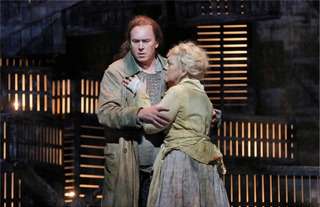|
Back
Revealing a great work Albany
Richard B. Fisher Center
07/24/2015 - & July 26, 29, 31, August 2, 2015
Ethel Smyth: The Wreckers
Katharine Goeldener (Thirza), Louis Otey (Pascoe), Neal Cooper (Mark), Sky Ingram (Avis), Michael Mayes (Lawrence), Dennis Peterson (Tallan), Kendra Broom (Jack), Peter Van Derick (Harvey), Daniel Hoy (One Man)
The American Symphony Chorus, James Bagwell (chorus master), The American Symphony Orchestra, Leon Botstein (conductor)
Thaddeus Strassberger (director), Erhard Rom (set designer), Kaye Voyce (costume designer), JAX Messenger (lighting designer), Hannah Wasileski (projection designer)

N. Cooper & K. Goeldener (© Cory Weaver)
Leon Botstein’s latest resurrected opera for Bard Summerscape is Dame Ethel Smyth’s The Wreckers, first performed in Dresden (in German) in 1906, and then in English in London in 1909. The libretto, written by a cosmopolitan, Europe-based American, Henry Brewster (he died in 1908) had originally been in French. The double translation the work went through might account for some of the weakness in its libretto. Aside from a certain awkwardness in the language, the work is striking for its confident musical and dramatic intensity. Also startling is the libretto’s depiction of religion (Christian in this case) twisted to serve brutal ends.
The story is set in 18th-century Cornwall. The residents of a remote village live as land-based pirates. They extinguish coastal beacons so that ships will be wrecked; they then murder the crews and pillage the cargoes. (This is rather luridly portrayed during the work’s overture.) The local pastor, Pascoe, preaches an aggressive religious sanction for these criminal activities; the result, to say the least, is an extremely solid (if not mafioso) sense of community. A young man named Adam secretly rebels and keeps beacons lit. He finds a soulmate in Pascoe’s young wife, Thirza. But: there is a rejected girlfriend, Avis, who creates much confusion when the community seeks the culprits foiling their criminal actions. An impromptu trial results in the two lovers embracing death together - one almost expects them to burst into “Viva la morte insieme”, the concluding utterance in Andrea Chenier.
It truly is a pity that this opera has been so neglected. It is interesting to compare it to two works of the period with relentlessly tragic libretti that have managed to obtain a place in the repertoire: Giordano’s Andrea Chenier of 1896, and Richard Strauss’ Elektra of 1909. Each of those is part of an established national repertory that serves to support the introduction of new operas and even new directions in the genre. (Maestro Botstein delights in pointing out the imperfections in operas firmly fixed in the canon.) The few British works tended to be orphaned solitaries (like this one, or Sullivan’s Ivanhoe of 1891) until, as we know, Benjamin Britten’s breakthrough, Peter Grimes, in 1945. The fact that aspects of The Wreckers - especially in its treatment of a tight community hostile to non-comformists - seem to have influenced Grimes is far from the only reason Smyth’s work deserves attention.
The fact that the opera was composed by a woman further served to marginalize it.
Right from the start the music packs a visceral punch - in fact the composer might stand accused of going too far to avoid any accusations of effeminacy in her style. The choral parts are very grand - Elgarian, in fact - and the orchestration reveals her German training. The influence of Wagner is evident, but there is nothing pallid or feeble in her attempts to maintain a consistent, highly declamatory style with big effects.
I was rather surprised that director Thaddeus Strassberger came up with an approach that embraces the work just as written - no framing, no updating - with period costumes. The only staging innovations I could spot were two: once when Pascoe forces on kiss on the young Avis, and later, in the argument with his wife, he slashes her hand. These two actions help motivate the hatred each of the women feels toward him.
When the beleaguered lovers meet and the idea is raised that Thirza might have to sacrifice herself (an idea she welcomes), a shaft of golden light descends upon her to the accompaniment of harp music. (When did you last see that? Probably never. Maybe it’s time for old devices to become new again.)
Erhard Rom’s set consists of piles of wooden cargo cases, representing both the villagers’ booty and the craggy locale. Hanna Wasileski’s projections vividly portray flames or flood when appropriate.
This is Leon Botstein’s second go at The Wreckers, having conducted a concert performance in 2007. The hefty orchestra never overwhelmed the singers, and James Bagwell’s chorus was in terrific form.
In many ways the character Pascoe dominates the action, and Louis Otey inhabits the role to a commanding degree. There is a bit of a surprise in the casting in that the idealistic young woman is a mezzo and the more troubled (and troublesome) woman is a soprano - and quite a young one, Sky Ingram (Avis), who handles the role’s demands extremely well. Katherine Goeldener as Thirza displays a warm, attractive tone.
Neal Cooper displays a essential degree of helden in the part of Adam. Some of his music can only be described as arioso narrative with orchestral punctuation and one isn’t sure if he is managing to keep in tune, but his stalwart delivery never flags. Michael Mayes is thunderous as Avis’s father, Lawrence.
In short,this was a revelation.
Next year’s operatic rarity at Bard: Pietro Mascagni’s Iris, dating from 1898.
Michael Johnson
|